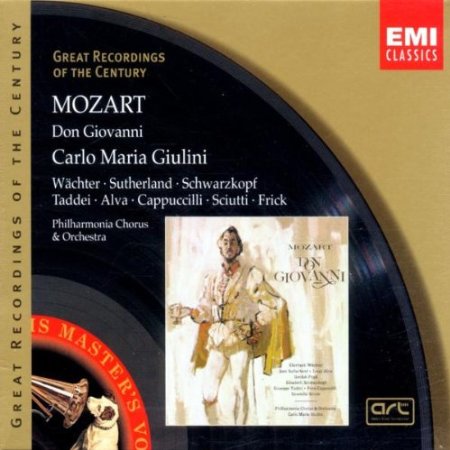Mozart Don Giovanni
View record and artist detailsRecord and Artist Details
Composer or Director: Wolfgang Amadeus Mozart
Genre:
Opera
Label: EMI
Magazine Review Date: 12/1987
Media Format: CD or Download
Media Runtime: 162
Mastering:
ADD
Catalogue Number: 747260-8

Tracks:
| Composition | Artist Credit |
|---|---|
| Don Giovanni |
Wolfgang Amadeus Mozart, Composer
Carlo Maria Giulini, Conductor Eberhard Waechter, Don Giovanni, Baritone Elisabeth Schwarzkopf, Donna Elvira, Soprano Giuseppe Taddei, Leporello, Bass Gottlob Frick, Commendatore, Bass Graziella Sciutti, Zerlina, Soprano Joan Sutherland, Donna Anna, Soprano Luigi Alva, Don Ottavio, Tenor Philharmonia Chorus Philharmonia Orchestra Piero Cappuccilli, Masetto, Bass Wolfgang Amadeus Mozart, Composer |
Author: hfinch
At last. The 1959 Giulini Don Giovanni has been digitally remastered and made available on CD. Philip Hope-Wallace, reviewing the original release, thought that it was worth a year at a foreign university. Well, I don't know if I'd go that far; but it is extremely difficult to choose between this and the Davis performance on Philips for non-stop momentum born of deep understanding of the musical expression of character and dramatic motivation.
There is no doubt that the orchestral playing here is unsurpassed. From the depth and precision of the opening chords to the fugitive spirit of dance which no one else quite captures, the Philharmonia under Giulini become a second cast on their own. So often the tiniest detail—the weight of a chord, the length of a silence, the linking curve of a phrase, the parting of the inner voices of the strings—stage-manages the drama more shrewdly than a good many theatre directors ever do. That having been said, I find Davis's pacing marginally more exciting. Giulini does, one feels, occasionally hold back to allow a voice its moment of glory; and the Act 1 finale hasn't quite that thrilling inexorability as the dance hurtles from form to chaos.
The presence of Dame Joan Sutherland does have its drawbacks as well as its glory. Her Donna Anna is never quite a ''furia disperata''; the comparative weakness of her lower register and her lack of real impulse in phrasing make her as a weak match for Schwarzkopf's Elvira as Te Kanawa's Elvira is for Arroyo's superb Anna for Davis. Only Haitink on EMI, it seems, with Vaness and Ewing, has a pair equally matched, at least in dramatic credibility: Glyndebourne's team casting is, of course, its great strength.
Schwarzkopf's Elvira, together with the orchestral playing, is the glory of this Don Giovanni. Listen to their relationship in ''In quali eccessi'': it could hardly be more potent, more intensely Mozartian. She understands the rhythmic and melodic psychology of her every second on stage. So does this Don Giovanni: though Waechter's thrusting physicality and diabolic laughter leave us just short of the sheer fascination of Wixell's hunter (Davis) or Allen's chilling seducer (Haitink).
The casting of the smaller parts doesn't make for such vibrant theatre as in either Davis or Haitink; but the care originally lavished on the production by Walter Legge is celebrated in remastering which cuts out glare and distortion, while losing none of the depth and perspective which belong uniquely to Giulini's reading.'
There is no doubt that the orchestral playing here is unsurpassed. From the depth and precision of the opening chords to the fugitive spirit of dance which no one else quite captures, the Philharmonia under Giulini become a second cast on their own. So often the tiniest detail—the weight of a chord, the length of a silence, the linking curve of a phrase, the parting of the inner voices of the strings—stage-manages the drama more shrewdly than a good many theatre directors ever do. That having been said, I find Davis's pacing marginally more exciting. Giulini does, one feels, occasionally hold back to allow a voice its moment of glory; and the Act 1 finale hasn't quite that thrilling inexorability as the dance hurtles from form to chaos.
The presence of Dame Joan Sutherland does have its drawbacks as well as its glory. Her Donna Anna is never quite a ''furia disperata''; the comparative weakness of her lower register and her lack of real impulse in phrasing make her as a weak match for Schwarzkopf's Elvira as Te Kanawa's Elvira is for Arroyo's superb Anna for Davis. Only Haitink on EMI, it seems, with Vaness and Ewing, has a pair equally matched, at least in dramatic credibility: Glyndebourne's team casting is, of course, its great strength.
Schwarzkopf's Elvira, together with the orchestral playing, is the glory of this Don Giovanni. Listen to their relationship in ''In quali eccessi'': it could hardly be more potent, more intensely Mozartian. She understands the rhythmic and melodic psychology of her every second on stage. So does this Don Giovanni: though Waechter's thrusting physicality and diabolic laughter leave us just short of the sheer fascination of Wixell's hunter (Davis) or Allen's chilling seducer (Haitink).
The casting of the smaller parts doesn't make for such vibrant theatre as in either Davis or Haitink; but the care originally lavished on the production by Walter Legge is celebrated in remastering which cuts out glare and distortion, while losing none of the depth and perspective which belong uniquely to Giulini's reading.'
Discover the world's largest classical music catalogue with Presto Music.

Gramophone Digital Club
- Digital Edition
- Digital Archive
- Reviews Database
- Full website access
From £8.75 / month
Subscribe
Gramophone Full Club
- Print Edition
- Digital Edition
- Digital Archive
- Reviews Database
- Full website access
From £11.00 / month
Subscribe
If you are a library, university or other organisation that would be interested in an institutional subscription to Gramophone please click here for further information.




